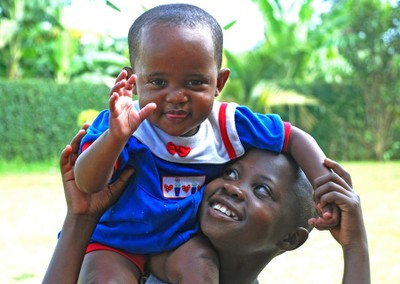Child Sponsorship background from Fort Portal, Uganda
 SOS Children's Village Fort Portal
SOS Children's Village Fort Portal
In order to meet the growing numbers of orphans and vulnerable children in this area, SOS Children’s Villages decided to construct an SOS Children’s Village in Fort Portal, including an SOS Nursery and an SOS Social Centre (Family Strengthening Programme).
The piece of land on which the SOS Village and facilities were to be constructed was donated by the local government. In 2011, construction work was finished and the first SOS families moved into their new homes.
The SOS Children’s Village Fort Portal comprises twelve family houses to accommodate approximately 120 children, a village director's house, aunts' house (SOS aunts take care of the children during their SOS mothers’ absence), “tukul”, which is an African hut to hold events, co-workers' house and an administration and service area
Other SOS Projects in Fort Portal
The scope of activities of SOS Children’s Villages Kakiri, Entebbe, Gulu and Fort Portal was enhanced during the last years by including SOS Family Strengthening Programmes which have been operated by the respective SOS Social Centre.
SOS Family Strengthening Programs aim to help vulnerable children to stay with their family if they are at risk of being separated from it. In order to achieve this SOS Children's Village closely co-operates with the families and local governments and supports them in their endeavours to take care of and protect their children in the best possible way. This kind of preventive action has been organized together with local authorities and other partners.
The SOS Children’s Village also includes an SOS Nursery which accommodates 100 children.
In order to rapidly provide vulnerable and destitute families and children with help, it was decided in 2009, before the SOS Children’s Village went into operation, to start an SOS Family Strengthening Program in Fort Portal. About 3000 children benefit from this programme per year.
Background to Fort Portal
Between 1998 and 2003, communities in the Kabarole district (western Uganda) were badly devastated by rebel activities of the Allied Democratic Forces (ADF), HIV/AIDS and Ebola.
The area remained largely underdeveloped with high poverty levels hence leading many people to live in the worst conditions without access to life’s basic needs. Children were the most affected.

 Return to Schools Wikipedia Home page…
Return to Schools Wikipedia Home page…
